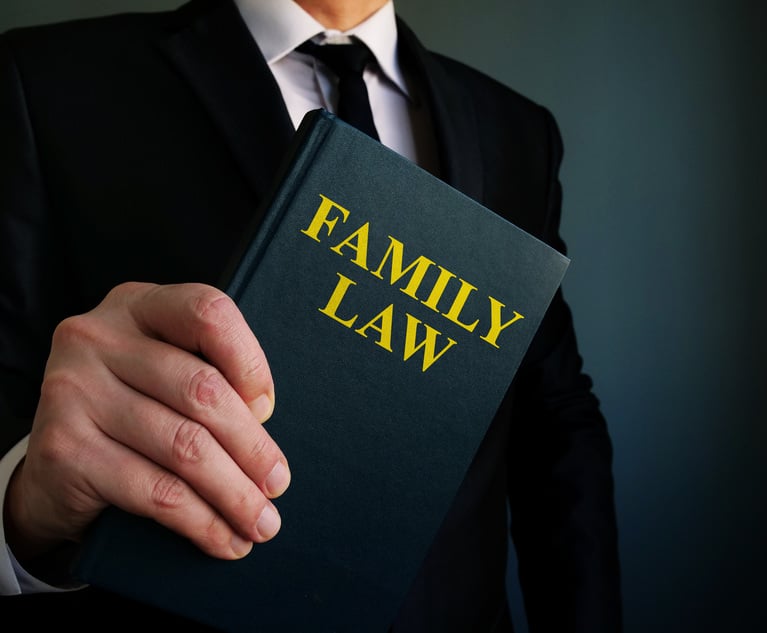Knowledge of Safe Havens Act Crucial for Mothers in Desperation
Recently we read about another desperate young woman who was pregnant, abandoned by the male who impregnated her, who abandoned her baby after giving birth in secret and under dangerous circumstances.
March 23, 2018 at 11:34 AM
6 minute read

Recently we read about another desperate young woman who was pregnant, abandoned by the male who impregnated her, who abandoned her baby after giving birth in secret and under dangerous circumstances.
We don't know much about her personal circumstances but most often, girls and young women in this situation are afraid to tell their families for fear of retribution, desertion or worse. The shame can be overwhelming. So they hide the pregnancy with loose-fitting clothing, don't get prenatal care and eventually give birth in isolation.
In this most recent case, the young woman abandoned the baby, whom she first bundled in warm clothing, after nursing him all day, hoping that by leaving him in a public place he would be discovered, cared for and loved. Fortunately, the baby was discovered and is doing well. A few days later, the woman turned herself in to police, only to be arrested and charged with child abandonment and risk of injury to a minor. She told them that she had given birth alone in her bedroom and abandoned the baby after realizing that she wasn't able to care for him. It has been reported that she has been offered a plea deal that would result in time in prison.
The woman told police that she wasn't aware of the state's safe haven laws, which allow new mothers to drop off babies less than 30 days old at any hospital with no questions asked.
Fortunately, this mother did not act in desperation, as did a Danbury girl who killed her newborn in 2006. Panna Krom was sentenced to 18 years and nine months in prison in 2007 after pleading guilty to manslaughter as part of a plea agreement. The daughter of Cambodian refugees, Krom turned 17 just six weeks before she gave birth. She hid the pregnancy from her family, delivered the baby in a bathroom in her family's apartment, drowned the baby in a toilet and then hid the body in a closet. Last year, Krom's sentence was commuted after she served nearly 10 years at York. She also had been unaware of the Safe Havens Act.
So while we don't assume that our readers are part of the demography most directly impacted by this act, we hope that we can at least raise visibility around the issue as lawyers who are part of the system that prosecutes, defends and judges these girls and young women; as concerned parents who have raised teenagers; and as attorneys representing schools through whose doors these girls pass.
Here is a list of the most frequently asked questions and answers:
What is the Safe Havens Act for Newborns?
The act is a new program that allows a parent to voluntarily give up custody of an infant age 30 days or younger to the nursing staff of an emergency room. The parent will not be subject to arrest for abandonment. This act does not protect the parent from being arrested and criminally prosecuted if abuse or neglect has occurred.
What will happen when I bring my infant to the emergency room?
A nurse will meet with you in a private area and ask you to provide information about your child's medical history. The nurse will also ask you questions about yourself such as your name and address. You do not have to answer any questions.
What will happen next?
You will be given a packet containing information on your rights and how to contact the Department of Children and Families.
What will happen to my infant when I leave the hospital?
Within 24 hours of your leaving the hospital, the nurse will be required to contact the DCF, who will take immediate custody of your infant. DCF will then begin to develop a plan of permanent care for the child. This plan will involve a court hearing to apply for legal termination of your parental rights to free the child for adoption.
Will DCF contact me or the other parent when they go to court?
DCF is required by law to notify both parents of its intent to keep custody of the infant and to seek termination of parental rights. If you have given your name and address or the name or address of the other parent, a court officer will notify you and the other parent of the court action and the first hearing date. If your names and/or addresses are not known, DCF may publish notice in the local newspaper and that will be the only notice you will receive.
What if I change my mind and want to regain custody of my child?
A request to be reunified with the child should be made to DCF as soon as possible. The parent should also apply to the court for an attorney. This is very important because the court can terminate your parental rights at the first hearing.
What is a termination of parental rights and when does it occur?
It means that the court will declare that you are no longer the parent of the child. You will be unable to make any decisions regarding the infant and the infant will be freed for adoption. The court will schedule a hearing within 30 days of DCF's application and termination of parental rights can be granted at the first hearing.
How long will it take for adoption to be completed?
If the court grants the termination petition, the court will appoint DCF as statutory parent and order DCF to submit a plan for adoption within 30 days. The court will continue to review the plan until adoption is finalized. DCF will file a petition in the local juvenile court, and after the hearing, the juvenile court may finalize the adoption.
What if I change my mind after the court process begins?
If you change your mind, you should seek legal advice. A parent has the right to an attorney in any neglect, uncared for or termination court action. If you cannot afford an attorney, the court will appoint one for you. You may call your local juvenile court to apply for the services of an attorney.
Since Connecticut's Safe Haven Act took effect in 2000, at least 27 babies whose overwhelmed mothers dropped them off at state hospitals have been adopted into loving homes. We hope 2018 sees fewer cases of ignorance of this lifesaving law.
This content has been archived. It is available through our partners, LexisNexis® and Bloomberg Law.
To view this content, please continue to their sites.
Not a Lexis Subscriber?
Subscribe Now
Not a Bloomberg Law Subscriber?
Subscribe Now
NOT FOR REPRINT
© 2024 ALM Global, LLC, All Rights Reserved. Request academic re-use from www.copyright.com. All other uses, submit a request to [email protected]. For more information visit Asset & Logo Licensing.
You Might Like
View All

Deviation From Shared Custody Guidelines Requires More Than Common Sense
5 minute readTrending Stories
Who Got The Work
Michael G. Bongiorno, Andrew Scott Dulberg and Elizabeth E. Driscoll from Wilmer Cutler Pickering Hale and Dorr have stepped in to represent Symbotic Inc., an A.I.-enabled technology platform that focuses on increasing supply chain efficiency, and other defendants in a pending shareholder derivative lawsuit. The case, filed Oct. 2 in Massachusetts District Court by the Brown Law Firm on behalf of Stephen Austen, accuses certain officers and directors of misleading investors in regard to Symbotic's potential for margin growth by failing to disclose that the company was not equipped to timely deploy its systems or manage expenses through project delays. The case, assigned to U.S. District Judge Nathaniel M. Gorton, is 1:24-cv-12522, Austen v. Cohen et al.
Who Got The Work
Edmund Polubinski and Marie Killmond of Davis Polk & Wardwell have entered appearances for data platform software development company MongoDB and other defendants in a pending shareholder derivative lawsuit. The action, filed Oct. 7 in New York Southern District Court by the Brown Law Firm, accuses the company's directors and/or officers of falsely expressing confidence in the company’s restructuring of its sales incentive plan and downplaying the severity of decreases in its upfront commitments. The case is 1:24-cv-07594, Roy v. Ittycheria et al.
Who Got The Work
Amy O. Bruchs and Kurt F. Ellison of Michael Best & Friedrich have entered appearances for Epic Systems Corp. in a pending employment discrimination lawsuit. The suit was filed Sept. 7 in Wisconsin Western District Court by Levine Eisberner LLC and Siri & Glimstad on behalf of a project manager who claims that he was wrongfully terminated after applying for a religious exemption to the defendant's COVID-19 vaccine mandate. The case, assigned to U.S. Magistrate Judge Anita Marie Boor, is 3:24-cv-00630, Secker, Nathan v. Epic Systems Corporation.
Who Got The Work
David X. Sullivan, Thomas J. Finn and Gregory A. Hall from McCarter & English have entered appearances for Sunrun Installation Services in a pending civil rights lawsuit. The complaint was filed Sept. 4 in Connecticut District Court by attorney Robert M. Berke on behalf of former employee George Edward Steins, who was arrested and charged with employing an unregistered home improvement salesperson. The complaint alleges that had Sunrun informed the Connecticut Department of Consumer Protection that the plaintiff's employment had ended in 2017 and that he no longer held Sunrun's home improvement contractor license, he would not have been hit with charges, which were dismissed in May 2024. The case, assigned to U.S. District Judge Jeffrey A. Meyer, is 3:24-cv-01423, Steins v. Sunrun, Inc. et al.
Who Got The Work
Greenberg Traurig shareholder Joshua L. Raskin has entered an appearance for boohoo.com UK Ltd. in a pending patent infringement lawsuit. The suit, filed Sept. 3 in Texas Eastern District Court by Rozier Hardt McDonough on behalf of Alto Dynamics, asserts five patents related to an online shopping platform. The case, assigned to U.S. District Judge Rodney Gilstrap, is 2:24-cv-00719, Alto Dynamics, LLC v. boohoo.com UK Limited.
Featured Firms
Law Offices of Gary Martin Hays & Associates, P.C.
(470) 294-1674
Law Offices of Mark E. Salomone
(857) 444-6468
Smith & Hassler
(713) 739-1250












